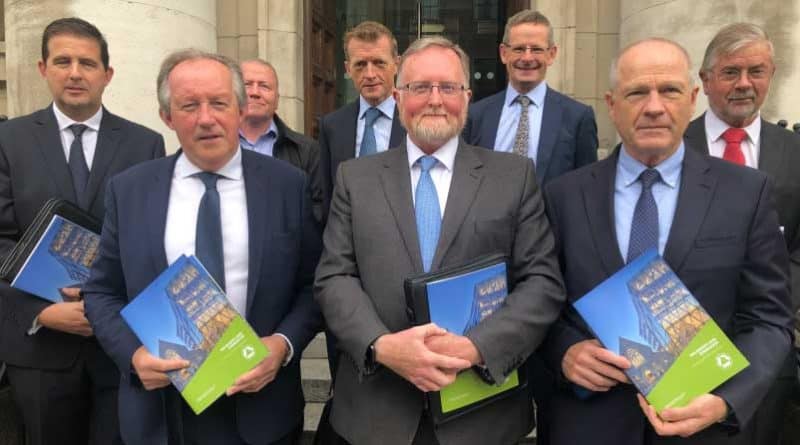CIF proposes extension of the Help to Buy scheme
CIF is calling for an extension of the Help to Buy scheme as a top priority in their recent Pre-Budget 2020 Submission.
Many house builders have reported that between 40% and 80% of homes sold to first time buyers are currently enabled by the Help to Buy Scheme. The measure is considered the most effective intervention by Government by Irish house builders in terms of enabling housing supply.
Tom Parlon, CIF Director General, said: “Housing completions are increasing on average 35% year on year between 2014-2018 expanding from 5,500 to 18,000 annual output in that period. The Help to Buy scheme has had a huge impact in driving this growth in annual output. Before the measure was introduced, young people are excluded from purchasing a home and were forced to rent, live at home and apply for social housing.
Currently, the Central Bank guidelines make it impossible for the average couple to secure mortgages. We’re proposing a shared equity scheme whereby the Government take a small stake in newly built houses to reduce the level of deposit required to secure a mortgage. We’re looking for other sensible and sustainable measures such as recognising rent history as proof of ability to repay mortgages.
There are myriad issues delaying the delivery of housing across Ireland. For example, statutory planning densities mandating extensive apartment building in rural and regional towns make it impossible to secure development finance for homebuilders to build housing. Allowing homebuilders to respond to changing consumer demands would enable them to secure finance and deliver housing developments that meet planning densities, regulations and standards.
Delivering infrastructure more efficiently is also part of the solution to Ireland’s housing crisis. However, our public sector procurement system is wholly inadequate in terms of delivering strategic infrastructure. Improving this system is the most significant step the Government could take in reducing project delays and cost overruns. Infrastructure delivery is key to the success of Project Ireland 2040. Unfortunately, large scale projects, particularly outside the GDA, are delayed or stalled at a time when our regions are slipping back and facing a rough Brexit.”
The CIF budget submission also highlighted several measures to ensure enough skilled labour in the industry to deliver essential housing and infrastructure over the coming decade. A key challenge is increasing the numbers of young people entering the industry. Recent CAO applications show that an additional 643 students selected third level courses in engineering, architecture and in construction as their first preference offer compared with last year (12,484 in 2019 versus 11,841 in 2018; this represents an increase of 5%). Apprenticeship registrations are recovering from a very low basis. However, recent CIF showed that 40% of parents would dissuade their children entering the construction industry. The CIF is suggesting that Government review the funding model for apprenticeship to enable SMEs to take on apprentices in larger number and to reinstate state payments for off the job training that were removed in 2014 from the €70m National Training Fund.
The construction industry is undergoing a strong recovery with investment expected to reach €41b by 2023. The concern is to ensure growth is sustainable and the industry is insulated from the volatility that has beset construction in the past. The concentration of activity in the Greater Dublin area should be of concern to the Government. The CIF’s recent crane count highlighted the fact that Dublin has over 120 cranes compared to only twelve in Cork, two in Limerick and two in Galway. This disparity of activity should be of grave concern considering that Cork, Galway and Limerick must grow at twice the rate of Dublin if Project Ireland 2040 is to succeed.
Pat Lucey, CIF President, said: “Construction is a significant part of our economy and in overall numbers appears to be performing well. At a time when we should be accelerating investment in and delivery of infrastructure and housing, we are seeing the dial moving in the other direction.”
“Government can redress this if they finance the planning and procurement process of critical infrastructure projects. The timeline for such projects is unpredictable but relatively small spending can enable projects and prevent inflation reducing the value of the exchequer’s investment. In addition, the Government must commit to engaging with contractors earlier in the design process for major projects with a view to preventing delays and cost overruns when construction begins. More genuine collaboration between Public Sector clients, design teams and the industry can yield significant returns to the Exchequer and of course the world class infrastructure this economy requires.”
CIF has recommended to Government that consideration is given to the various budgetary recommendations as set out under the themes People, Infrastructure, Housing, and Climate Action. These recommendations are focused on achieving the greatest return on investment from existing and planned expenditure in terms of:
- enabling a better quality of life and improved wellbeing for all citizens;
- improving Ireland’s economic competitiveness and climate resilience; and
- addressing capacity constraints across the economy and the built environment.
To see the full list of recommendations and to view the CIF Pre-Budget 2020 Submission, click here.
Pictured above:
LtoR front row: Tom Parlon, CIF Director General, Pat Lucey, CIF President, Tommy Drumm, MBCA President.
LtoR back row: Joe Delaney, MEBSCA Chairman, John G Murphy, Murphy International, Neil Durkan, IHBA Chairman, Hubert Fitzpatrick, CIF COO, and Tony O’Leary, ASCA Chairman.


